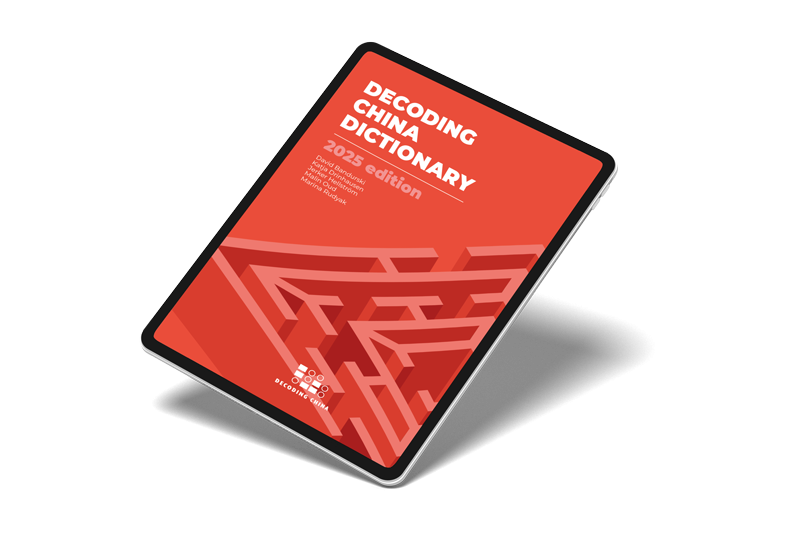
KEY TERM
Free and Open Internet
[ 自由开放的网络 ]
[ 自由开放的网络 ]
Free and Open Internet

In China, internet governance is shaped by “cyber sovereignty” concerns. The state promotes the flow of data for economic benefits, but remains wary about ideological threats and has implemented a comprehensive censorship regime.
Brief
Over the past decades, the internet has become a global foundation for communication and trade. UN norms call for an open, free, and secure cyberspace where human rights are fully protected and advocate a multi-stakeholder governance system that includes civil society. However, states increasingly restrict information flows for various reasons, including privacy, data security, combating disinformation, national security, or to maintain political control.
In international forums, China supports an open internet, emphasising its economic potential. Domestically, the government-driven rapid digitisation has brought significant benefits for communication, commerce, and public administration. But China has also created one of the most comprehensive censorship systems and heavily restricts information flows across its borders, to contain what the Party sees as ideological risks.
Through exports, loans, and cooperation agreements, China’s government and its telecommunication firms are a major force in enabling connectivity, particularly in the Global South. While this helps countries expand access and reap the benefits of digitisation, China also shares its technologies and approaches for internet control. Cybersecurity and cyber sovereignty are key concepts in the PRC’s internet governance approach, indicating that a “free” internet is what remains after states have exercised their interests.
Analysis
In the 1990s, concepts of net neutrality reflected a utopian vision of the internet as a global public space free from government control. Though this proved unattainable, international norms still enshrine commitments to a free and open internet, including the 2024 UN Global Digital Compact. As home to over 1.1 billion internet users and many of the world’s largest digital infrastructure providers and tech firms, China is a major actor in defining global concepts and standards for internet governance.
China’s leadership recognised the internet’s potential early on, with government policies since the 1990s aiming to harness the potential of digitisation and (more recently) establish China as a “cyber power” (网络强国). With notable success: The digital economy is now a key driver of growth, even in rural areas. China’s communication platforms connect citizens and provide access to information, while the digitisation of public services has boosted efficiency.
But from the outset, the Party-state has been deeply concerned about ideological threats emanating from an untamed flow of information. CCP leader Xi Jinping has described cyberspace as a key “battleground” for ensuring “ideological security”, warning against “Western permeation” and extolling the importance of “winning online dominance”, both at home and abroad. During his tenure, cybersecurity and cyber sovereignty emerged as the key terms in internet governance. International appeals to internet freedom are lambasted as an effort to undermine China’s internal cohesion.
The government has spent decades building a sophisticated system of internet controls that uses a combination of technology and regulation to censor domestic information flows and block access to major foreign platforms. Increasingly, it also prevents foreign access to the Chinese information sphere. Regulations and campaigns to create a “civilised”, “clean” and “healthy” cyberspace target fraud and misinformation as well as political expression. While the internet in China remains a venue for public expression, with commentators often using allegories and wordplay to discuss social issues, the government has been largely successful in reining in political debates and online public mobilisation. As AI reshapes how citizens engage with the internet, China’s government is at the forefront of regulation, requiring developers to ensure content adheres to “socialist core values”.
In 2015, Xi Jinping introduced the vision of building “a community of shared future in cyberspace” (网络空间命运共同体). This term has become a cornerstone of China’s digital diplomacy, featuring prominently in its 2017 international cooperation strategy on cyberspace and a 2022 white paper. While China calls for international cooperation to prevent cyber-crime and conflicts, it envisions a state-led approach to global internet governance, in which corporations and especially civil society only play a complementary, supportive role.
On the international stage, China regularly calls for efforts to bridge the global digital divide. Through agreements, loans and digital infrastructure built by Chinese companies, China helps countries expand internet access as well as digital control. And yet a growing number of countries impose restrictions on Chinese platforms and technology providers over data and national security concerns. All of these trends contribute to a fragmentation of the global internet, subverting the vision of a free and open online space.
How to cite this article:
Research related to this term was supported by:

Related Articles That Might Interest You


“The Cooperation Principle” – Wang Yi Receives Sweden’s Foreign Minister in Beijing





